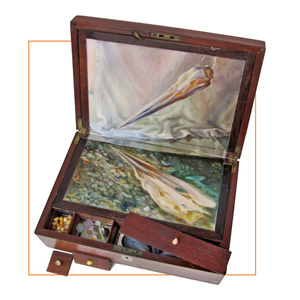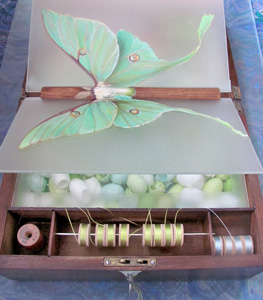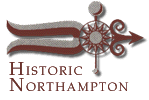

Letters from Away
An Exhibition by Elizabeth Pols
Contemporary Art at Historic Northampton
May 8 - June 7, 2015
 |
Letters from the Cove |
In Letters from Away, Elizabeth Pols responds to Historic Northampton’s collection of writing slopes, to its silk moth specimen cabinet and to its portrait of Henry James taken by local photographer Katherine McClellan during James' second visit to Northampton.
For this exhibition Pols creates four new writing slope pieces. A 19th century writing slope was a portable wooden box that opened out to a sloped writing surface with compartments for pens and inkwells, a low-tech precursor to our 21st century laptop. They speak to the silk industry, to Henry James's first novel and to the recovered photographs of two Massachusetts women who traveled extensively in the Middle East just before and after World War II.
 |
Beloved Indigenous |
For example, Beloved Indigenous began with a writing slope quite similar to Historic Northampton’s own Martha Whitmarsh desk (daughter of Samuel Whitmarsh, the original Florence silk mill founder). Pols has also used the writing slope to re-envision the specimen box, based on our native Actias Luna moth instead of the Chinese Bombyx mori moth imported by the silk industry. Rather than trapping her moths under glass, she paints her luna moth in flight on open glass panels.
A number of Pols’s panel paintings of Venice will support the narratives of her writing slope pieces. And, thanks to a grant from the Northampton Arts Council and the Massachusetts Cultural Council, the exhibit will include two photographic wall hangings from the collection of the two travelers to Syria.
About the Artist
Elizabeth Pols is a painter who lives and works in Belchertown, and exhibits in Massachusetts and Maine. Her most recent one-person show was at the Offices of Senator Stanley Rosenberg at the State House in Boston. For more about the artist and her work, visit www.elizabethpols.com
This program is supported in part by a grant from the Northampton Arts Council and the Massachusetts Cultural Council.
|





